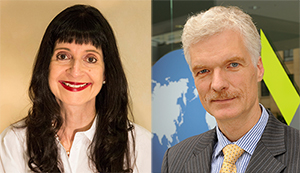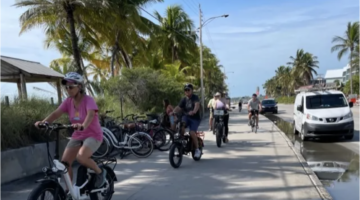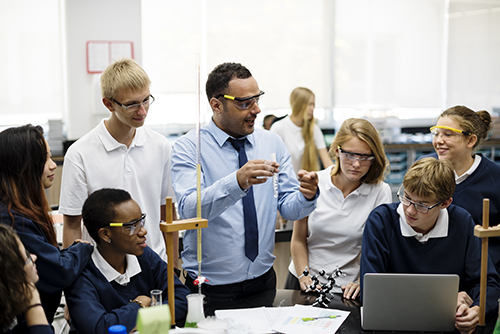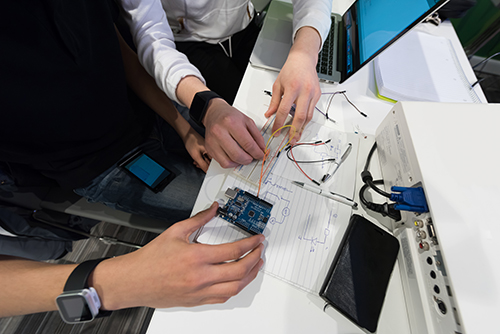The Global Search for Education: Wanted: Collaborative Problem Solvers!
By C. M. Rubin
Girls outperformed boys in every country. “Girls show more positive attitudes towards relationships, meaning that they tend to be more interested in others’ opinions and want others to succeed.” — Andreas Schleicher
We live in a world where trust and teamwork is more important than ever. OECD Pisa has completed the first ever assessment of collaborative problem solving skills (CPS) to see how students stand in relation to their global peers. In some of the main takeaways from this study, Andreas Schleicher, OECD Director for the Directorate of Education and Skills, notes that students who do well in PISA’s reading and math assessments also tend to be strong performers in CPS. Examples are Japan, Korea, Estonia, Finland and Canada, all of whom did well. However, there are countries where students had different results in CPS than you would predict from their performance in science, reading and math. For example, Japanese students do well in the subjects but even better in CPS. Chinese students were just average in CPS despite being strong performers in math and science. Another interesting take away from the study is that girls outperformed boys in every country. “Girls show more positive attitudes towards relationships, meaning that they tend to be more interested in others’ opinions and want others to succeed.” Classroom activities focused on positive student/teacher interactions and presentation work foster problem solving skills. Hence, teachers can help “facilitate a climate that is conducive to collaboration”.
The Global Search for Education welcomes the OECD’s Andreas Schleicher to discuss the study further.
“Disadvantaged students see the value of teamwork often more clearly than their advantaged peers. They tend to report more often that teamwork improves their own efficiency, that they prefer working as part of a team to working alone.” — Andreas Schleicher
Welcome, Andreas. What did you learn about disadvantaged students?
It is interesting that disadvantaged students see the value of teamwork often more clearly than their advantaged peers. They tend to report more often that teamwork improves their own efficiency, that they prefer working as part of a team to working alone, and that they think teams make better decisions than individuals. So schools that build on those attitudes by designing collaborative learning environments could engage disadvantaged students in new ways. Interestingly, the data also show that exposure to diversity in the classroom tends to be associated with better collaboration skills.
And of course, education does not end at the school gate when it comes to helping students develop their social skills. For a start, parents need to play their part. For example, students score much higher in the collaborative problem-solving assessment when they said their parents were interested in their child’s school activities.
What happens outside school – using the Internet, playing video games, meeting friends or working in the household – can also have a social, and sometimes antisocial, component. PISA shows that students who play video games score much lower than students who do not play video games, and that gap remains even after considering social and economic factors as well as performance in science, reading and math. But accessing the Internet, chatting or social networking tends to be associated with better collaborative problem-solving performance, all other things being equal.
Given the variations in educational environments and cultures globally, what methodology did you use?
In order to ensure similar assessment conditions, we used an agent-based approach where students interacted with digital avatars as their counterparts. We then did a validation study to explore to what extent this kind of human-computer collaboration is an adequate representation of human-human collaboration with similar tasks. And we found this to be a fairly reasonable match.
“Strong academic skills will not automatically also lead to strong social skills. Part of the answer lies in giving students more ownership over the time, place, path, pace and interactions of their learning.” — Andreas Schleicher
How do you predict technological advancements will be a driver for focusing on these competencies in curriculum?
Social media but also interactive platforms for knowledge sharing and knowledge creation already play an important role in many instructional systems. And as technology advances, schools can use a greater variety of collaborative learning environments. But even without technology, there are many opportunities which schools have today to foster collaborative skills across the school curriculum. Strong academic skills will not automatically also lead to strong social skills. Part of the answer lies in giving students more ownership over the time, place, path, pace and interactions of their learning. Another part of the answer can lie in fostering more positive relationships at school and designing learning environments that benefit students’ collaborative problem-solving skills and their attitudes towards collaboration.
How should schools determine the skills to teach their students to prepare them for jobs that have not yet been created?
This is a difficult question. But there are some things in which we can be fairly confident. Important are people who think creatively about the development of new products, the introduction of new enterprises and the deployment of new business models. In the years running up to 2030 and beyond, some experts suggest that an increasingly digitized economy will be built around small, agile companies, employing just a handful of carefully chosen people. But creating new value will be important well beyond the sphere of the economy. Creating new value, as a transformative competency, connotes processes of creating, making, bringing into being and formulating; and outcomes that are innovative, fresh and original, contributing something of intrinsic positive worth. It suggests entrepreneurialism in the broader sense of being ready to venture, to try, without anxiety about failure. The constructs that underpin the competence are imagination, inquisitiveness, persistence, collaboration and self-discipline.
The growing complexity of modern living, for individual, communities and societies, also suggests that the solutions to our problems will be also be complex: in a structurally imbalanced world, the imperative of reconciling diverse perspectives and interests, in local settings with sometimes global implications, will require young people to become adept in handling tensions, dilemmas and trade-offs. Individuals will need to think in a more integrated way that avoids premature conclusions and attends to interconnections. The constructs that underpin the competence include empathy (the ability to understand another’s perspective and to have a visceral or emotional reaction); adaptability (the ability to rethink and change one’s perceptions, practices and decisions in the light of fresh experience, new information and additional insight); and trust.
A third transformative competency is a prerequisite of the other two. Dealing with novelty, change, diversity and ambiguity assumes that individuals can ‘think for themselves’. Equally, creativity and problem-solving require the capacity to consider the future consequences of one’s actions, to evaluate risk and reward and to accept accountability for the products of one’s work. This suggests a sense of responsibility, and moral and intellectual maturity, with which a person can reflect upon and evaluate their actions in the light of their experiences and personal and societal goals; what they have been taught and told; and what is right or wrong.
“Societies that nurture binding social capital and pluralism have always been more creative, as they can draw on and bring to bear the best talent from anywhere, build on multiple perspectives, and nurture creativity and innovation.” — Andreas Schleicher
Out of classroom activities affect collaborative problem solving abilities. How do we ensure that students from different learning environments and backgrounds have the same opportunity and access to activities that promote collaborative learning?
This is one of the greatest challenges for education. But PISA shows that some countries are much better than others in ensuring that they attract the most talented teachers to the most challenging classrooms and provide the best resources to the students who can benefit from the most.
What do you see as the next step in growing social skills among children in school?
These days, schools need to become better at preparing students to live and work in a world in which most people will need to collaborate with people from different cultures, and appreciate a range of ideas and perspectives; a world in which people need to trust and collaborate with others despite those differences, often bridging space and time through technology; and a world in which individual lives will be affected by issues that transcend national boundaries.
We are born with what political scientist Robert Putnam calls “bonding social capital”, a sense of belonging to our family or other people with shared experiences, cultural norms, common purposes or pursuits. But it requires deliberate and continuous effort to expand our radius of trust to strangers and institutions, to create the kind of binding social capital through which we can share experiences, ideas and innovation, and build a shared understanding among groups with diverse experiences and interests. Societies that nurture binding social capital and pluralism have always been more creative, as they can draw on and bring to bear the best talent from anywhere, build on multiple perspectives, and nurture creativity and innovation.
Thank you Andreas.
(All photos are courtesy of CMRubinWorld)

C. M. Rubin and Andreas Schleicher
Join me and globally renowned thought leaders including Sir Michael Barber (UK), Dr. Michael Block (U.S.), Dr. Leon Botstein (U.S.), Professor Clay Christensen (U.S.), Dr. Linda Darling-Hammond (U.S.), Dr. MadhavChavan (India), Charles Fadel (U.S.), Professor Michael Fullan (Canada), Professor Howard Gardner (U.S.), Professor Andy Hargreaves (U.S.), Professor Yvonne Hellman (The Netherlands), Professor Kristin Helstad (Norway), Jean Hendrickson (U.S.), Professor Rose Hipkins (New Zealand), Professor Cornelia Hoogland (Canada), Honourable Jeff Johnson (Canada), Mme. Chantal Kaufmann (Belgium), Dr. EijaKauppinen (Finland), State Secretary TapioKosunen (Finland), Professor Dominique Lafontaine (Belgium), Professor Hugh Lauder (UK), Lord Ken Macdonald (UK), Professor Geoff Masters (Australia), Professor Barry McGaw (Australia), Shiv Nadar (India), Professor R. Natarajan (India), Dr. Pak Tee Ng (Singapore), Dr. Denise Pope (US), Sridhar Rajagopalan (India), Dr. Diane Ravitch (U.S.), Richard Wilson Riley (U.S.), Sir Ken Robinson (UK), Professor Pasi Sahlberg (Finland), Professor Manabu Sato (Japan), Andreas Schleicher (PISA, OECD), Dr. Anthony Seldon (UK), Dr. David Shaffer (U.S.), Dr. Kirsten Sivesind (Norway), Chancellor Stephen Spahn (U.S.), Yves Theze (LyceeFrancais U.S.), Professor Charles Ungerleider (Canada), Professor Tony Wagner (U.S.), Sir David Watson (UK), Professor Dylan Wiliam (UK), Dr. Mark Wormald (UK), Professor Theo Wubbels (The Netherlands), Professor Michael Young (UK), and Professor Minxuan Zhang (China) as they explore the big picture education questions that all nations face today.
The Global Search for Education Community Page
C. M. Rubin is the author of two widely read online series for which she received a 2011 Upton Sinclair award, “The Global Search for Education” and “How Will We Read?” She is also the author of three bestselling books, including The Real Alice in Wonderland, is the publisher of CMRubinWorld and is a Disruptor Foundation Fellow.
Follow C. M. Rubin on Twitter: www.twitter.com/@cmrubinworld
[livemarket market_name="KONK Life LiveMarket" limit=3 category=“” show_signup=0 show_more=0]






No Comment